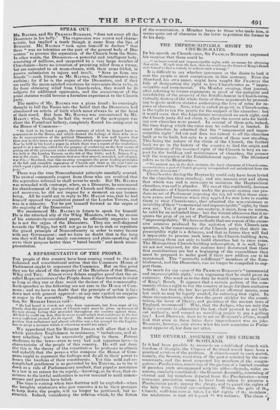A REPRESENTATIVE OF THE PEOPLE.
THE people of this country have been coming round to the old- fashioned and constitutional notion that the Commons House of Parliament ought to represent the Commons. But on this point they are far ahead of the majority of the Members of that House, Whig and Tory. Almost every debate supplies proof that the so- called Representatives of the People deem it their function to resist as long as they can or dare resist the desires of the commonalty. Such speeches as the following are not rare in the House of Com- mons; and we have no doubt that the principle of action it lays down met with general approval—at any rate excited no surprise or anger in the assembly. Speaking on the Church-rate ques- tion, Sir ROBERT INGLIS said- " Ile had heard it stated, not only from opponents, but from some of his friends, that the present system of Chureh.rates must be given up. because of the very strong feeling that prevailed throughout the country against them. All that he could say was, that he never Irma admit that resistance to the law was a sufficient ground for its repeal. lie would never consent to the pro- position that turbulence and almost rebellion was a fair ground for the Legisla- ture to adopt a measure which it otherwise would not enact." We apprehend that Sir ROBERT INGLIS will allow that a law which provokes Englishmen to resistance, " turbulence, and al- most rebellion," must be excessively galling to them. Patient obedience to the laws—even to very bad and injurious laws—is characteristic of the people of this country. He will not deny (for this is the theory of the constitution he professes to admire and uphold) that the persons who compose the House of Com- mons ought to represent the feelings and do all in their' power to lessen the burdens of their constituents. Yet this mild and ac- complished gentleman is so perverted by his Toryism, as to lay it down as a rule of Parliamentary conduct, that popular resistance to a law is no reason for its repeal,—knowing, as he does, that re- sistance to the lawful authorities is never resorted to until remon- strance and petition have failed.
The time is coming when this doctrine will be exploded—when the haughty aristocrats who now conceive it to be their province to keep down the people, will no longer be petitioned, but in- structed. Indeed, considering the relation which, by the fiction
of the constitution, a Member bears to those who made him, it seems quite out of character in the latter to petition the former to do his duty.


























 Previous page
Previous page